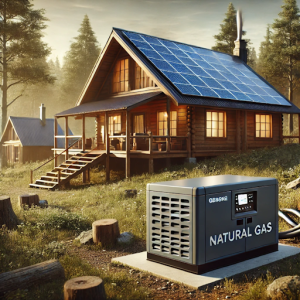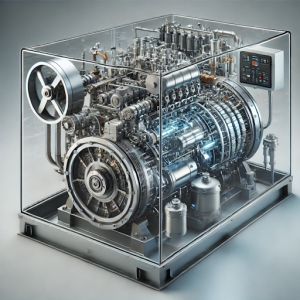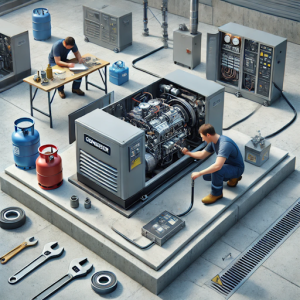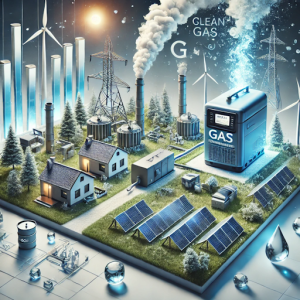Discover the Advantages of Natural Gas Generators for Effective Off-Grid Power Supply
Natural gas generators are increasingly recognized as an exceptional power solution for those living in remote areas, such as homes or cabins, where traditional electricity sources are either unreliable or completely absent. To embark on a successful off-grid journey, it is essential to understand the various power generation methods available. Natural gas generators offer numerous benefits, including high reliability, cost efficiency, and environmentally friendly operation, making them a compelling choice for off-grid enthusiasts focused on sustainability and energy efficiency.
As society becomes more reliant on technology, the concept of off-grid living has garnered significant interest from individuals seeking freedom from conventional power sources. The motivations to pursue this lifestyle can include a desire for sustainability, self-sufficiency, or simply a longing for a simpler way of life. Embracing off-grid energy solutions allows you to harness power derived from renewable resources or alternative fuels, ensuring a comfortable existence without dependency on traditional electricity providers.
By arming yourself with the necessary knowledge and preparation, you can seamlessly incorporate a natural gas generator into your off-grid lifestyle, guaranteeing that your essential energy needs are met consistently. This article aims to delve into the multitude of benefits that natural gas generators provide, explain how they function, and highlight crucial factors to consider when choosing and installing them for your off-grid setup.
 Transform Your Energy Independence with Off-Grid Power Solutions
Transform Your Energy Independence with Off-Grid Power Solutions
- Off-grid power solutions empower you to break free from traditional energy dependencies, making them vital for remote living or during unexpected power interruptions.
- Natural gas generators deliver reliable and efficient energy production, emitting significantly lower pollutants compared to diesel or gasoline counterparts.
- These generators function by combusting natural gas to generate mechanical energy, which is then converted into electrical energy through an integrated generator system.
- When selecting a natural gas generator, it is essential to assess factors like power output, fuel efficiency, and maintenance requirements to guarantee optimal functionality.
- Proper installation and regular maintenance are crucial for ensuring that your natural gas generator operates efficiently and safely.
Uncover the Unique Benefits of Natural Gas Generators for Energy Needs
One of the standout features of natural gas generators is their remarkable reliability. When you choose a natural gas generator to meet your off-grid energy demands, you can trust in a continuous power supply tailored specifically to your requirements. Unlike solar panels or wind turbines, which can be significantly impacted by adverse weather conditions, natural gas generators provide stable energy production regardless of external factors.
This dependability is particularly vital for those who rely on electricity for critical activities, such as heating, refrigeration, or operating necessary medical devices. Knowing that your generator will supply power during crucial moments brings a sense of security and peace of mind. Besides this reliability, natural gas generators also offer substantial cost benefits.
Although the initial purchase price might exceed that of some alternative off-grid solutions, the long-term savings can be quite significant. Typically, natural gas is more economical than gasoline or diesel, leading to lower operational expenses over time. Additionally, maintenance requirements for natural gas generators are generally less intensive than those for other fuel types, allowing you to save both time and money while enjoying a reliable energy source.
 Understanding the Functional Operation of Natural Gas Generators
Understanding the Functional Operation of Natural Gas Generators
Natural gas generators work by converting the chemical energy found in natural gas into electrical energy through a combustion process. When the generator is activated, natural gas mixes with air and ignites within the engine’s combustion chamber. This ignition generates high-pressure gases that propel the engine’s pistons, ultimately rotating the generator’s rotor and producing electricity.
This operational process is known for its efficiency, as it is cleaner in comparison to other fossil fuel options. An essential component of these generators is their fuel system, which typically includes a regulator to control the gas flow, ensuring optimal performance. Modern natural gas generators are often equipped with advanced features such as automatic start/stop functions and remote monitoring capabilities.
These innovative attributes greatly enhance user convenience, enabling you to manage your energy supply more effectively and making your off-grid lifestyle much simpler.
Key Considerations for Selecting the Right Natural Gas Generator
| Key Factor | Details |
|---|---|
| Power Requirements | Evaluate the generator’s necessary power output based on the appliances and devices you plan to use. |
| Fuel Selection | Choose natural gas as your fuel option for its clean-burning and affordable characteristics. |
| Size and Mobility | Select a generator that fits your available space and meets your mobility requirements. |
| Noise Level | Examine the generator’s noise output to ensure it aligns with the acceptable standards for your living environment. |
| Starting Mechanism | Choose between manual or automatic starting options based on your convenience and frequency of use. |
When it comes to selecting a natural gas generator for your off-grid configuration, several crucial factors should be assessed. Start by evaluating your power needs; determine the total wattage required to support your essential appliances and devices, ensuring that the generator you choose can handle the load effectively.
It is advisable to opt for a generator that exceeds your calculated requirements slightly to account for potential spikes in power demand. Another essential consideration is the generator’s portability and installation requirements. If you plan to move your generator often or use it in various locations, seek out a lightweight and easily transportable model.
Moreover, decide whether you prefer a stationary unit or a portable generator that can be set up based on your needs. Finally, consider the noise level of the generator; quieter options can greatly enhance your off-grid experience by minimizing disruptions and preserving the peacefulness of your surroundings.
 Adopt Best Practices for the Installation and Maintenance of Natural Gas Generators
Adopt Best Practices for the Installation and Maintenance of Natural Gas Generators
Installing a natural gas generator requires thoughtful planning and execution to ensure both safety and efficiency. Begin by selecting a suitable site for your generator, ensuring it complies with local regulations and safety standards. Ideally, this location should be well-ventilated and far enough from flammable materials.
You may also need to construct a concrete pad or platform to secure and protect the generator from moisture damage. After identifying the best location, connect the generator to your natural gas supply line. If you lack expertise in gas line installations, consider hiring a professional to ensure that all safety protocols are followed.
Once the fuel connection is established, set up the necessary electrical connections to integrate the generator with your home’s electrical system. Regular maintenance is essential for keeping your generator running smoothly and efficiently. This includes routine checks of oil levels, replacing air filters, and inspecting spark plugs to maintain optimal performance.
Cost Analysis: Comparing Natural Gas Generators with Alternative Off-Grid Power Solutions
When assessing the financial implications of off-grid energy solutions, conducting a comprehensive comparison between natural gas generators and other options, such as solar panels and diesel generators, is crucial. While solar energy systems are often lauded for their renewable qualities, they typically require a significant upfront investment in panels, batteries, and inverters. Moreover, solar systems may fail to provide adequate power during cloudy days or at night without sufficient battery storage.
On the other hand, diesel generators are recognized for their reliability; however, they usually incur higher fuel costs and necessitate more frequent maintenance than natural gas generators. Given the volatility associated with diesel fuel prices, natural gas frequently presents a more stable and cost-effective solution across various regions. A long-term cost analysis indicates that natural gas generators generally offer a more economical choice for those pursuing off-grid living.
 Assessing the Environmental Footprint of Natural Gas Generators in Off-Grid Living
Assessing the Environmental Footprint of Natural Gas Generators in Off-Grid Living
As you evaluate your off-grid energy alternatives, it is vital to consider their environmental impact. Natural gas is often promoted as a cleaner alternative to other fossil fuels, such as coal or oil, due to its lower carbon emissions during combustion. By choosing a natural gas generator, you can significantly reduce your carbon footprint while enjoying reliable energy for your off-grid lifestyle.
However, it is important to recognize that natural gas remains a fossil fuel, and its extraction can lead to environmental challenges. Methane leaks during the extraction and transportation processes contribute to significant greenhouse gas emissions. To address these issues, prioritize sourcing natural gas from reliable suppliers committed to sustainable practices.
Additionally, incorporating renewable energy sources alongside your natural gas generator can further emphasize your dedication to environmental sustainability and responsible energy consumption.
Inspiring Real-Life Examples of Successful Off-Grid Power Solutions Utilizing Natural Gas Generators
Examining real-world applications can provide valuable insights into how natural gas generators have been effectively employed in off-grid living situations. Many rural homeowners have made successful transitions to natural gas generators as their primary energy source after experiencing repeated outages from traditional utility services. The adoption of these generators has enabled them to achieve energy independence while ensuring a continuous supply of electricity for heating, cooling, and essential appliances.
A compelling case study involves remote cabins that rely on natural gas generators for seasonal use. Due to their secluded locations, these cabins often lack access to conventional power sources. Natural gas generators allow cabin owners to enjoy modern conveniences like refrigeration and lighting without sacrificing their connection to nature.
These success stories illustrate how natural gas generators can effectively support off-grid living, providing comfort and reliability. As you embark on your off-grid journey, consider the extensive advantages that natural gas generators offer. From their reliability and cost-effectiveness to their relatively minimal environmental impact, these generators can significantly contribute to achieving energy independence.
By carefully selecting the appropriate model for your needs and adhering to proper installation and maintenance guidelines, you can smoothly transition into an off-grid lifestyle powered by natural gas.
Addressing Frequently Asked Questions About Natural Gas Generators
What is the definition of a natural gas generator for off-grid use?
A natural gas generator for off-grid applications is a power generation system that utilizes natural gas as a fuel source to generate electricity in remote areas where access to the main power grid is limited or nonexistent.
How does a natural gas generator function in off-grid scenarios?
A natural gas generator designed for off-grid use operates by combusting natural gas within an internal combustion engine. This combustion process creates mechanical energy, which is subsequently converted into electrical energy through a generator. The electricity produced can power a variety of appliances, equipment, and lighting in off-grid environments.
What are the primary advantages of using a natural gas generator for off-grid living?
Key benefits of utilizing a natural gas generator for off-grid living include:
– Lower fuel costs compared to diesel or gasoline generators
– Cleaner combustion leading to reduced emissions
– Continuous fuel supply sourced from natural gas pipelines
– Lower maintenance needs compared to other fuel types
What considerations should be taken into account when using a natural gas generator for off-grid living?
Important factors to consider when utilizing a natural gas generator in off-grid situations include:
– Availability of natural gas supply in your region
– Initial installation and equipment expenses
– Regular maintenance and servicing requirements
– Environmental impacts and compliance with emissions regulations
Is it practical to use a natural gas generator for off-grid residential and commercial applications?
Natural gas generators designed for off-grid use are suitable for both residential and commercial purposes. They are frequently employed in remote homes, cabins, farms, and small businesses that do not have access to the main power grid.
The post Natural Gas Generators for Off-Grid Power Solutions appeared first on Survival Bite.
The Article Natural Gas Generators: Your Off-Grid Power Solution Was Found On https://limitsofstrategy.com
Comments
2 responses to “Natural Gas Generators for Off-Grid Power Solutions”
I really appreciate your insights on natural gas generators! The reliability and environmental benefits you mentioned resonate with me, especially since I’ve been exploring off-grid options for my cabin up in the mountains. It’s fascinating how technology has evolved to provide us with more sustainable choices while still addressing our need for power.
The discussion around natural gas generators for off-grid power supply is particularly relevant in today’s context where more individuals are seeking alternatives to traditional energy sources. As someone who has spent considerable time researching various methods for sustainable living, I find the transition towards natural gas generators quite compelling, especially when we consider their operational reliability and efficiency.